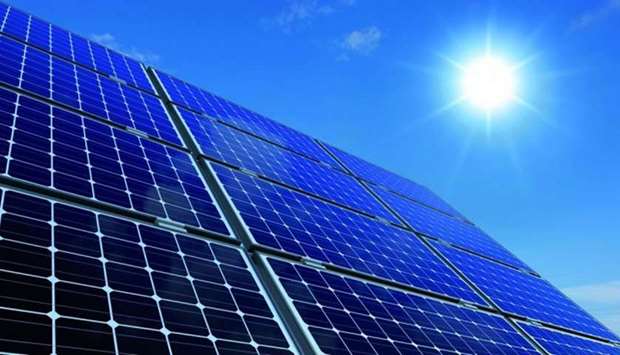GCC chemical companies have begun to invest in renewable technologies and projects, such as wind and solar as they look to transform towards cleaner energy sources, according to the Gulf Petrochemicals and Chemicals Association (GPCA).
Qatar Petroleum got involved in a solar power plant development through its JV with Qatar Electricity & Water Company, Siraj Energy. Al Kharsaah PV solar power plant is the first large scale solar power plant being developed in Qatar, GPCA noted.
The impact of the Covid-19 pandemic has led to income deterioration, decreasing demand, and growth setbacks for the GCC chemical industry.
“The last 12 months were far from easy for Arabian Gulf producers who were forced to operate at decreased production levels with severe shortage of manpower and unprecedented supply chain disruptions,” noted Nuriya Ismagilova, Research and Studies specialist, GPCA.
Ongoing challenges led to unexpected project delays, readjustment of capital expenditure and redefining companies’ strategic priorities. Nevertheless, regional players remained committed to long-term expansion plans, advancing their sustainability agenda, eliminating inefficiencies and reinventing themselves to grow their global competitiveness, GPCA said.
Despite facing significant supply chain disruptions, the GCC chemical industry stepped up efforts to safeguard the supply of raw materials for the manufacture of products used to enable the hygiene, testing and treatment of patients affected by coronavirus, alongside personal protective equipment for medical staff, as well as ensuring the continued manufacturing of essential food packaging material.
As reported by ACC, Mena petrochemicals output was stable up until May 2020. Production saw some decline during the summer months and has been bouncing back from August 2020 onwards.
With prices for key petrochemicals falling to their lowest since the 2008 global financial crisis, the GCC chemical industry felt a significant impact on its revenue in 2020. Most regional chemical companies were hurt due to plunging prices and collapsing demand during the first two quarters of this year and started to only bounce back in the third quarter (Q3) but haven’t yet fully recovered.
In Q2, 2020, publicly listed companies in the GCC reported 20%-35% in revenue drop. The third quarter appeared to be much better with revenue increasing by 33%. This strength in growth in the third quarter is attributed to better demand in key value chains.
GPCA noted the collapse in oil and petrochemical prices, together with dramatically changed market dynamics, has reduced the cash flows of major chemical producers in the GCC. This makes it tougher for GCC chemical companies to move forward with their expansion plans. Some projects have already been announced to be delayed, while configurations are being reconsidered and even cancelled.
"Despite the disruption it caused to the economy and society, the coronavirus pandemic has only accelerated the GCC’s circular economy efforts. Several projects, initiatives and commitments were made during 2020 in the GCC," GPCA said.
The impact of the Covid-19 pandemic has led to income deterioration, decreasing demand, and growth setbacks for the GCC chemical industry.
“The last 12 months were far from easy for Arabian Gulf producers who were forced to operate at decreased production levels with severe shortage of manpower and unprecedented supply chain disruptions,” noted Nuriya Ismagilova, Research and Studies specialist, GPCA.
Ongoing challenges led to unexpected project delays, readjustment of capital expenditure and redefining companies’ strategic priorities. Nevertheless, regional players remained committed to long-term expansion plans, advancing their sustainability agenda, eliminating inefficiencies and reinventing themselves to grow their global competitiveness, GPCA said.
Despite facing significant supply chain disruptions, the GCC chemical industry stepped up efforts to safeguard the supply of raw materials for the manufacture of products used to enable the hygiene, testing and treatment of patients affected by coronavirus, alongside personal protective equipment for medical staff, as well as ensuring the continued manufacturing of essential food packaging material.
As reported by ACC, Mena petrochemicals output was stable up until May 2020. Production saw some decline during the summer months and has been bouncing back from August 2020 onwards.
With prices for key petrochemicals falling to their lowest since the 2008 global financial crisis, the GCC chemical industry felt a significant impact on its revenue in 2020. Most regional chemical companies were hurt due to plunging prices and collapsing demand during the first two quarters of this year and started to only bounce back in the third quarter (Q3) but haven’t yet fully recovered.
In Q2, 2020, publicly listed companies in the GCC reported 20%-35% in revenue drop. The third quarter appeared to be much better with revenue increasing by 33%. This strength in growth in the third quarter is attributed to better demand in key value chains.
GPCA noted the collapse in oil and petrochemical prices, together with dramatically changed market dynamics, has reduced the cash flows of major chemical producers in the GCC. This makes it tougher for GCC chemical companies to move forward with their expansion plans. Some projects have already been announced to be delayed, while configurations are being reconsidered and even cancelled.
"Despite the disruption it caused to the economy and society, the coronavirus pandemic has only accelerated the GCC’s circular economy efforts. Several projects, initiatives and commitments were made during 2020 in the GCC," GPCA said.


